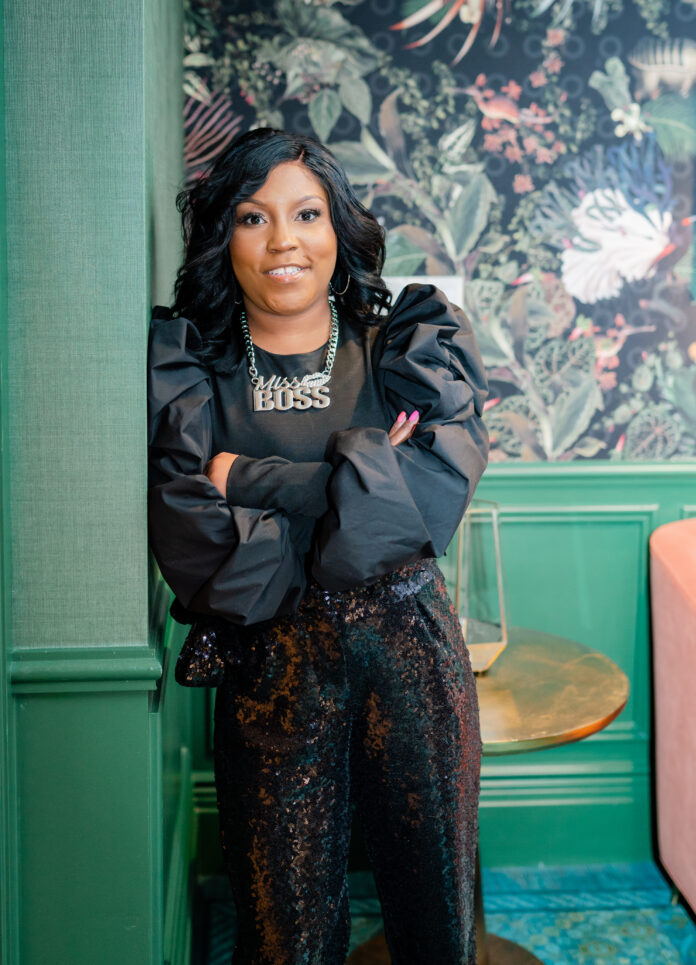( ENSPIRE Feature ) Entrepreneur and Business Consultant Latasha Brooks Talks How to Maintain a Healthy Work-Life Balance
ENSPIRE Contributor: Sophia Kang
Serial entrepreneur Latasha Brooks was all business even before her first business class. As a sixth-grader, Latasha organized community events and choreographed high school theater productions, leading and coordinating high school kids at least two years older than she was on stage. Latasha was only 18 when she landed her first corporate job. “I’m just going to call you MoneyBaggs because everything you do produces money,” an old colleague told her when they first met.
Today Latasha is “most passionate about using her voice to educate, transform, and impact others.” In 2018, she launched MoneyBaggs Mentoring Program because she saw a need to make business mentoring more accessible. She’s also the Founder and CEO of Coach Brooks Business Consulting, which offers branding, media training, business coaching, and other services for new business owners.
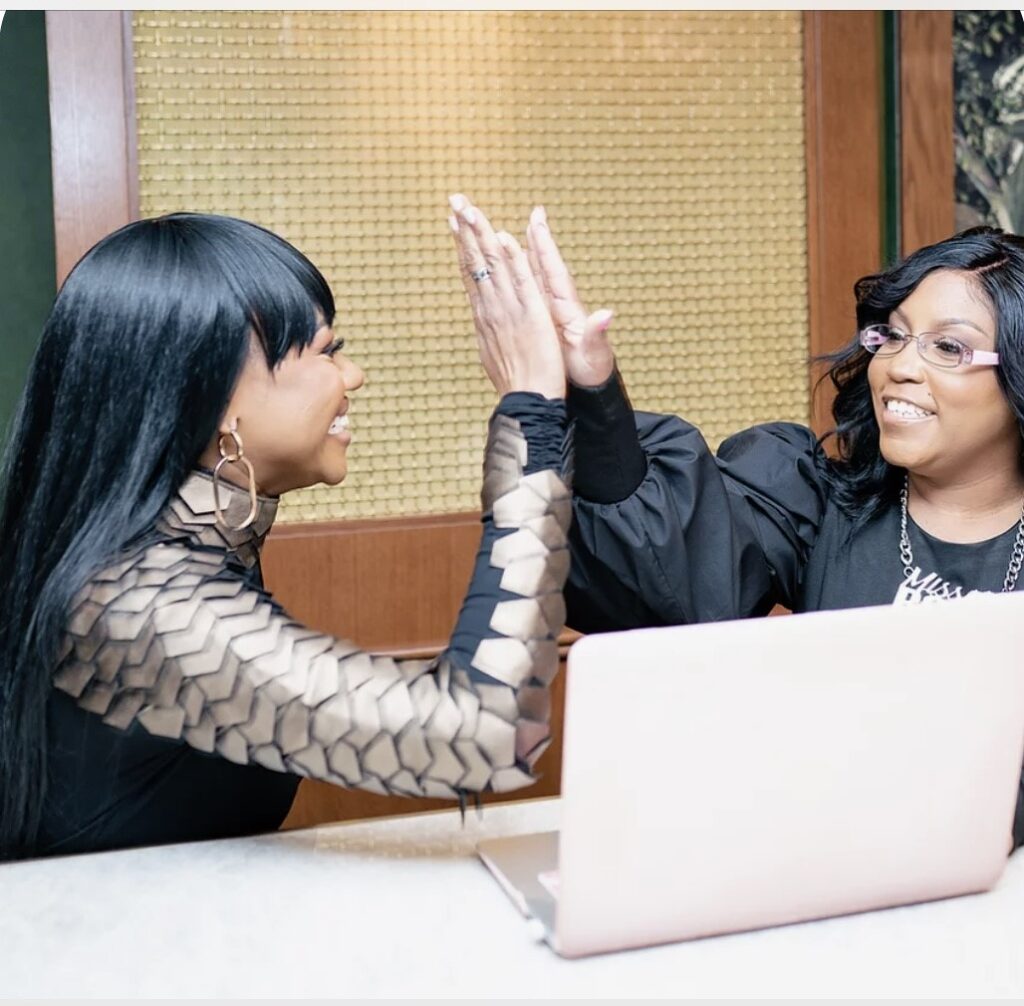
ENSPIRE spoke with Latasha about how she started as an entrepreneur, the challenges that came with starting her own business, and the values that fuel her success:
How did you get started as an entrepreneur?
When I was in sixth grade, I was auditioning for a performing arts studio, the largest performing arts studio in my city. And that same night, my oldest sister needed me for business. So I had to decide if I was going to audition for the Performing Arts studio, or if I was going to bail my sister out, who really needed me for her project. And I bailed my sister out. That’s what started my entrepreneurial life. So at a very young age, in sixth grade, I started helping with event planning, choreographing, managing high schoolers and events and shows, and things like that.
And so the skill sets that I’ve learned to deal with older people and being the youngest in the group but having the most authority landed me my first corporate job at 18 years old, and I was making, like, $50,000. At 18. I started training and helping corporations develop, and things like that. That’s when I launched my consulting business. Because it just all kind of flowed.
Many people say that the first five years of any business are always a mess. What were some challenges that came with building your business?
A part of my story is me explaining to people how entrepreneurs need GPS systems. We need guidance. And a lot of us don’t realize that at first. We’re like, “Oh, I can do this.” When I branched off from my sisters and started my business, I was like, “Oh, I can do this. I’ve been doing this since sixth grade. I can do this.” And then I got in the car to start my entrepreneurial journey.
And, literally, the first five years were just a waste. I did nothing. I learned nothing. I didn’t know who to follow. I didn’t know what to do. I didn’t know that I needed to strategize. I didn’t know what I was supposed to plan. I also didn’t know it costs a lot of money. So for the first five years, I did nothing. I owned a business, and I was just able to say I was a business owner.
Can you tell me more about your MoneyBaggs Mentoring program?
I created the mentoring program because so many entrepreneurs are lost. They need guidance. They need help. And group coaching is much easier than one-on-one coaching. Although I do both because during the pandemic I saw there was a need for affordable group coaching. I launched the $37 program through which I can help many people.
The thing that people don’t understand about business is that when you’re developing the business, it doesn’t matter what industry you’re in. There are some things that we all just have to do. We all have to focus on structure. We all have to file taxes. We all have to strategize and plan and build a team. So instead of me focusing on a specific industry, with the MoneyBaggs Mentoring, I focus on business development because what I teach them is something that everybody can use.

That’s super cool that you’re giving these people the mentoring that you didn’t have when you started your business. How did you get yourself out of that rut? How did your business grow into what it is today?
It goes back to how I started in business—I started by saving somebody. In those five years that I wasn’t focused on myself, I was focusing on helping everybody else. I’ve always helped other people. The first five years, it wasn’t about me at all. It was like, “Girl, you’ll get to that list. Let’s help the other people because I just didn’t know what to do with me.” I was very good at helping other people get to this spot, but not myself.
And so, after those five years, I was like, “Okay, you got to focus on yourself. How can you keep helping everybody else and not take a moment to say, ‘Okay, now it’s time for me to focus on myself and develop my own company?’” And so, I had to invest, and I had to learn from other people. And I had to figure out what exactly I wanted to do for me.
I started investing in coaches, and I started investing in courses and classes. And then I kind of got a better feel of what I wanted to do with me and my companies. And then I could grow my companies because I took the time to develop myself and say to myself, “Stop putting yourself on the backburner. Time to get serious.” Because it’s not just about having fun helping everybody else. This is really a business. This could really take care of the family. This could really break the generational curses. I started taking [my business] seriously.
Who has had the biggest influence on your entrepreneurial success?
I would have to say, Michelle Obama. The eight years that she was First Lady and being able to see a woman that looks like me in the position that she was in and just doing what she was doing on her own and not even with the President. She still had her own identity. She was an attorney, and so, watching and following her path of just being able to be your own person, even though you’re married to the President. I’m married to a Marine, and in the military world, normally the wives are the stay-at-home moms and they do nothing. In the military world, it’s all about your husband. It’s all about his rank. It’s all about him. And I felt like I could relate to Michelle because I had my own identity. I had my own business. I didn’t sit at home and do nothing. She was such a motivation for me because I was like, “I can do this. I’m my own person.”
Can you talk about what your mantra, “The goal is to be paid and free, not booked and busy”, means?
The first five years of my business were a joke. Everybody around me was telling me, “You gotta be booked and busy. If you’re not booked and busy, then you’re not winning. If you’re not booked and busy, you’re not paid.” And so, I started adding stuff to my calendar whether or not I was getting paid, just to be able to say I was doing something. I was told that was how I would become successful. You gotta be booked and busy.
But nobody told me that when you’re booked and busy, and your calendar is completely filled, you’re also booked and tired. You’re booked and stressed. You’re booked and not spending time with your family or your kids. You’re booked and underpaid. And you’re booked and overworked.
And so, I started transitioning into paid and free. I started researching and learning about passive income and how to properly plan and structure my calendar. My calendar doesn’t have to be filled up with stuff to feel like I’m successful. There are other ways that I can be a successful entrepreneur and, also, happy. I was trading my time for money. “You pay me, I’ll do whatever.” But that doesn’t mean happiness. And people are like, “Entrepreneurs aren’t supposed to sleep.” Yes, we are supposed to sleep. We’re not getting any sleep. Our head’s not clear. I just got away from that. And I’m so thankful that I did because it allows me to teach other people that whoever created those rules, it’s their rules. You get to write your own story. We don’t have to go after what society says a successful entrepreneur is. Not anymore.
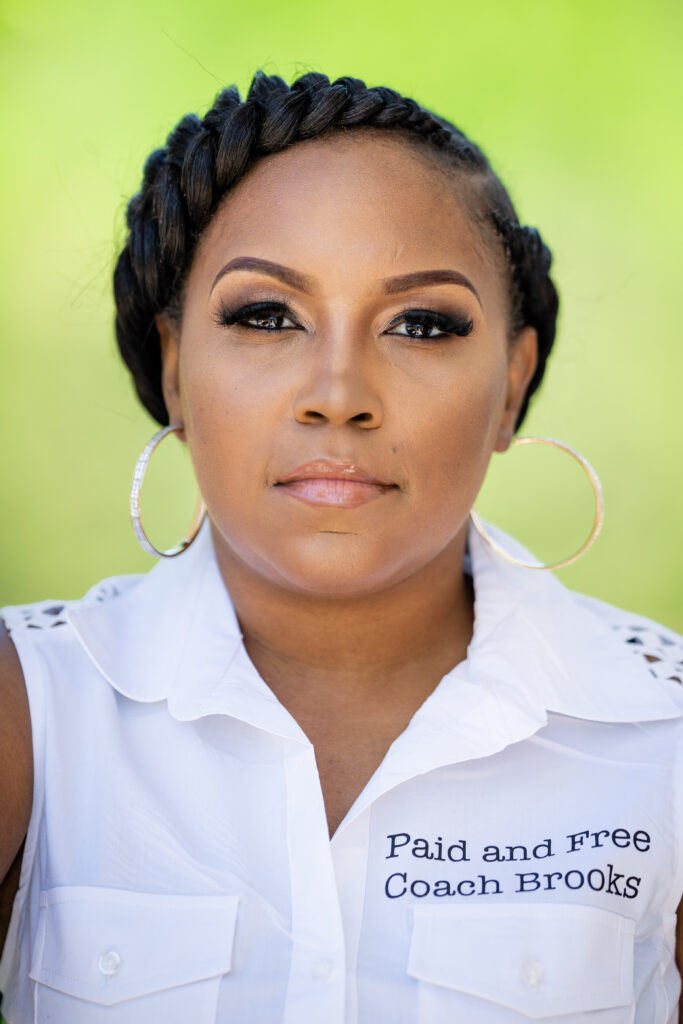
That’s the perfect segue into my next question. How do you balance your business and everything else in your life? Your social life? Spending time with your family? What are some of the daily habits or affirmations that have contributed to your success?
About five years ago, I had a conversation with myself, and I decided I wanted to do things that make me happy. And so, what I did was I started removing the stuff from my life that just made other people happy. I started managing my time correctly so that I can balance work, school, kids, husband, and business. Using your time wisely makes life so much easier for you. While I’m cleaning up, I’m listening to an audiobook. While I’m cooking dinner, I’m spending time with my children because they like to cook, too. When I shut down the business and I walk out of my home office, I’m separating business from personal life. Because there are times that you take that laptop everywhere you go, and you can’t separate business from personal. That’s not healthy.
And it took my family saying something to me for me to understand this stuff. It’s my husband’s saying, “Every time I come to get into bed, you got five laptops, iPads, cell phones, everything on my side of the bed.” He can’t even get in the bed cause it’s full of business stuff. My oldest daughter was saying, when I picked her up from school and I wasn’t on the phone, “Oh, this is the first time you’re not on the phone.” And it kind of shocked me because I was like, “Wait a minute if you felt that way, how come you never expressed that to me?” And so, we had a conversation about it and she’s like, “When I get up in the morning, you’re on the phone. When you pick me up from school, you’re on the phone.” Cause I used to drive my kids to and from school. All they knew was Mom is always working.
And so, when I had those conversations, I changed my schedule. My time is everything. I just had to learn how to balance it all and make it work—but make it work in a way that makes me happy. I’ve implemented systems. And those systems allow me to stay on track and do the things that I’m supposed to do. When we’re cooking, we clean up while we’re cooking. When the clothes come out of the dryer, put them up. If you let them sit there, that’s a bad habit. If you make it a system that when clothes come out of the dryer, you stop what you’re doing and put them up, now you’re building systems. And systems allow you to manage your time better.
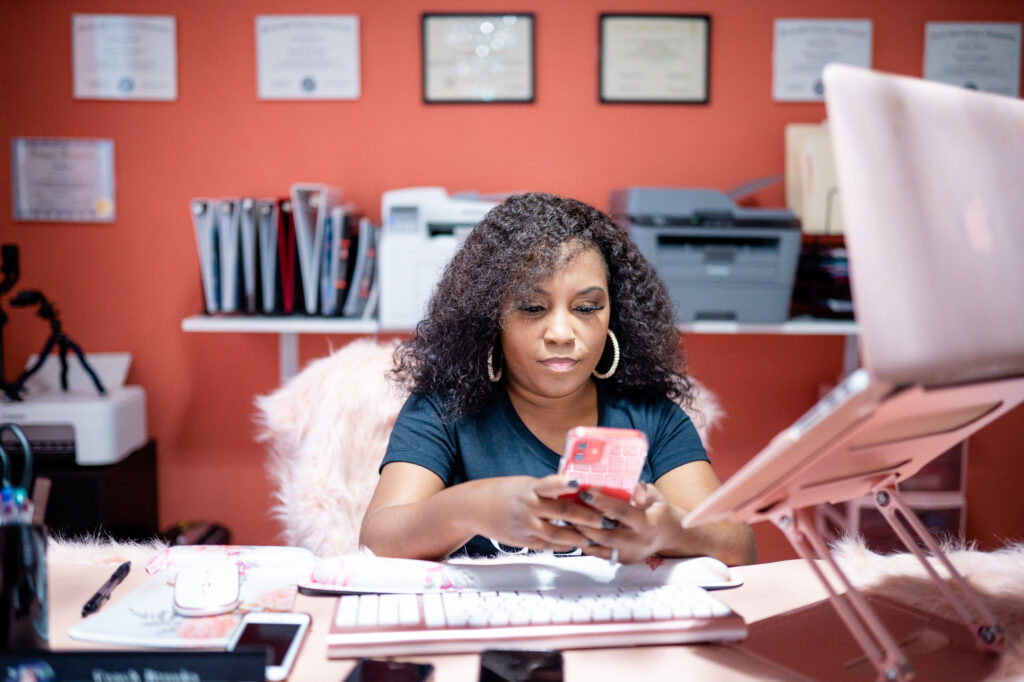
What are the values that fuel your success as an entrepreneur?
I am big on being authentic. I’m very big on being honest and trustworthy.
When I came into the entrepreneurial world, it was a bunch of fluff. I don’t know how to describe it. The entrepreneurial world is just like politics, you know; it’s very calculated. Businesses prey on the weak, and it’s never about you. And so, I always value being me because of the way I feel about it when it comes to life, it’s so easy to be fake. It’s harder to be real because when you are real, people attack and people try to find something to make you bad. Because you’re just too real.
People trust me; they know that whatever I say, I’m giving it to them from the heart. You’re not going to get any BS with me. I promised myself that I never want to pretend. And that’s what my reviews are always about. My name carries so much weight. And that’s just because I’ve always been real. Minorities, we don’t get help. Things are ten times harder for us. People hide a lot of stuff from us. We have to pay and invest a lot of money in order to even get help.
And so, I’ve always wanted to be the opposite. I’ve always wanted to be the one that’s like, “I’m going to help you.” Everybody knows that when they come to me, I’m going to help them. They know that I’m going to give it to them raw. And they know that it’s not going to be any fluff or BS with me because I’ve been through that. When it comes to my name, and who and what I represent, I stand on it.
What advice would you give to an aspiring entrepreneur?
I always tell entrepreneurs not to do it by themselves. The first five years that a lot of us waste is because we don’t have anybody. And the entrepreneurial world is very lonely. You can’t trust people, and people don’t want to really help you. And so, when you’re lonely in this business, you go into depression. Or you waste your time as I did. And so, I try to tell people to get around other like-minded entrepreneurs and have some type of support because everybody in life needs support. It doesn’t matter what you’re doing in life. We all need some type of support.
So what’s next for you as an entrepreneur? Where do you see yourself in, like, the next five or ten years?
With me transitioning to paid and free, I only want to do the things I enjoy doing in life.
For the next five to ten years, it’s going to be educating. I’m never going to get away from that because it’s a passion for me. It doesn’t feel like work. I’m working on some new book projects. And I have some celebrity clients that I work with, so I want to increase my celebrity clientele. I want to do more with minority communities. My number one focus is the minority community, especially women. Especially single mothers. Because I was a single mother, I can remember thinking that life was just over. I was going through a divorce, I was pregnant, and I was just like, “What am I going to do?” And to be where I’m at now after eight years, after going through all that, I’m like, “Anybody can do it.” If I can do it, anybody can do it.
I want to work a lot more. My 501(c)(3) deals with children and single mothers and small business owners. I want to do more community work, helping people like myself. Life happens after the tragedy, you know?
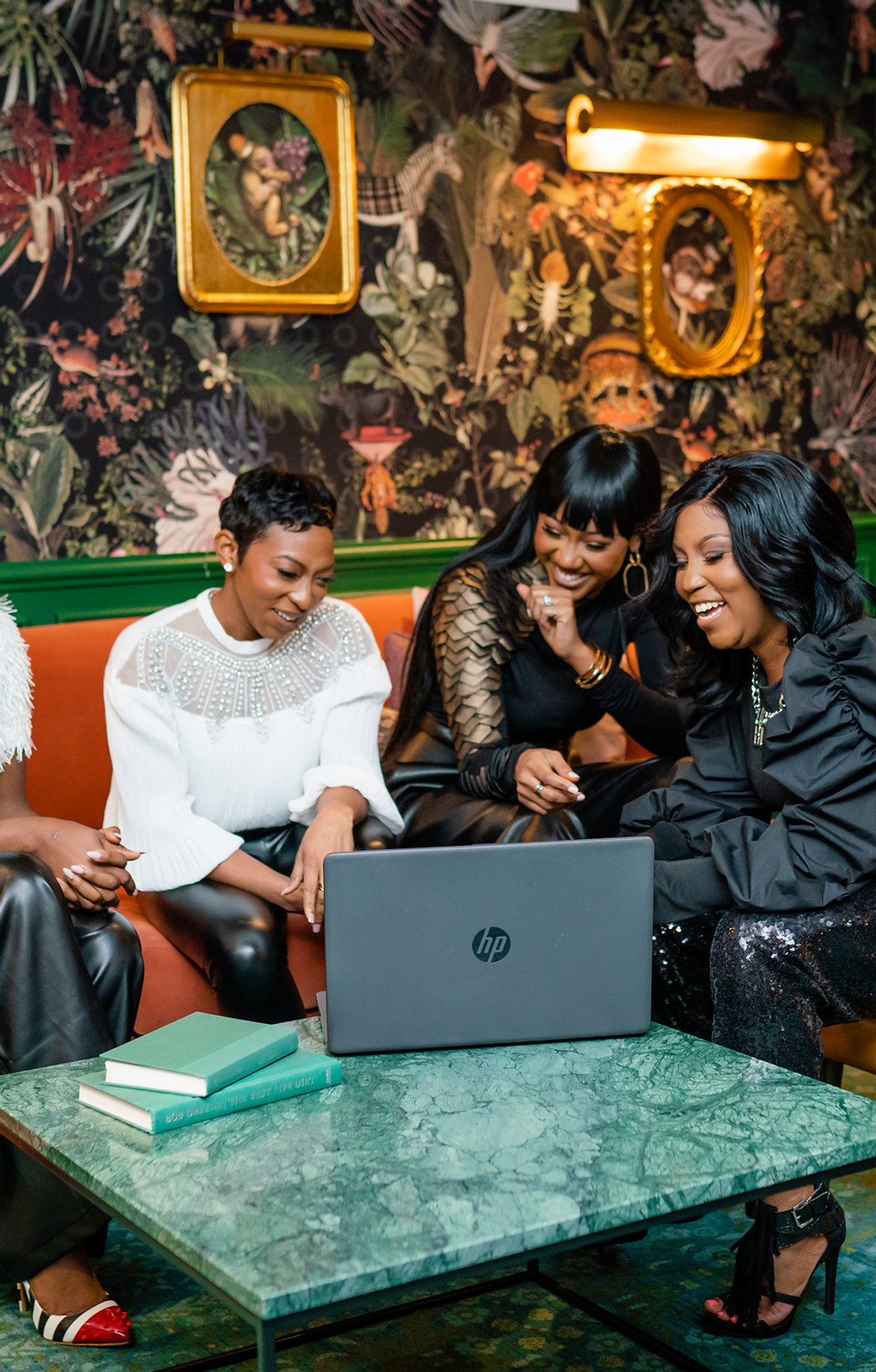
Find Latasha on Instagram.
Related Article: CEO Robiar Smith Runs Pest Control Business

